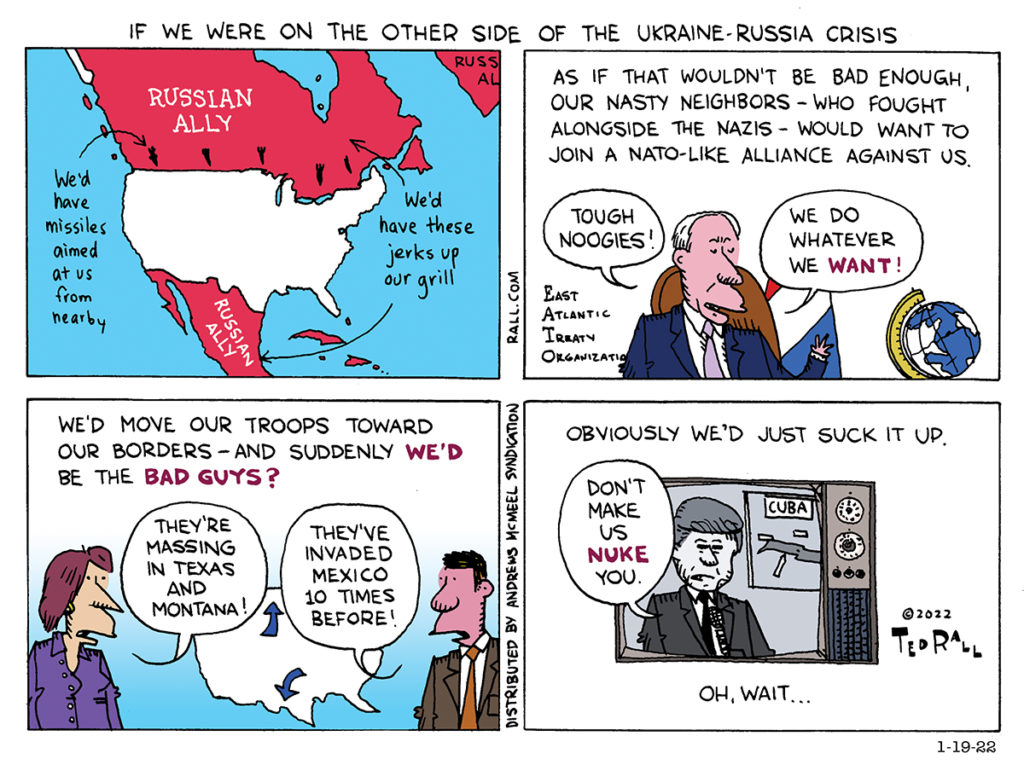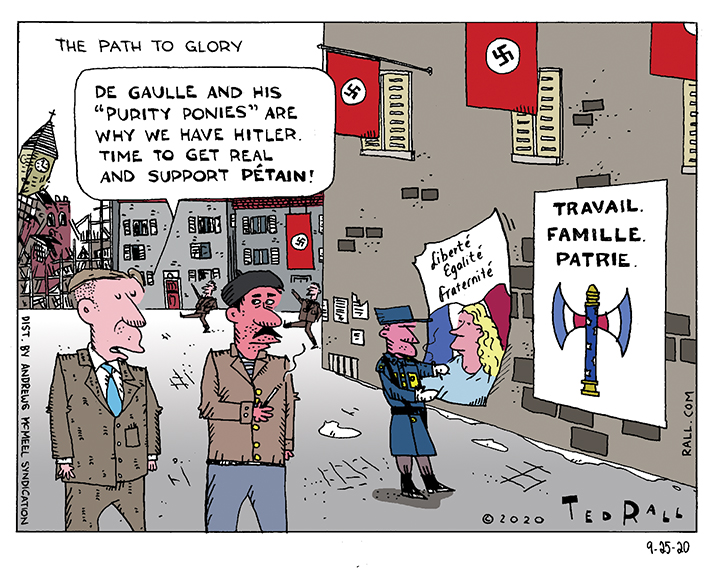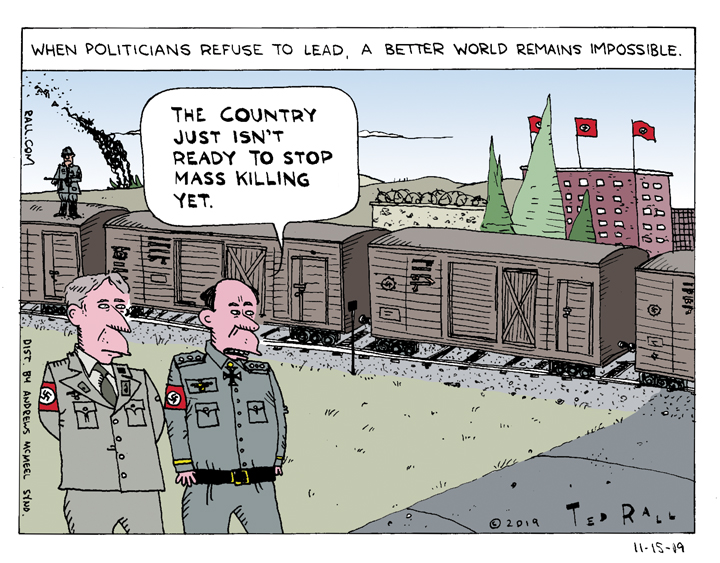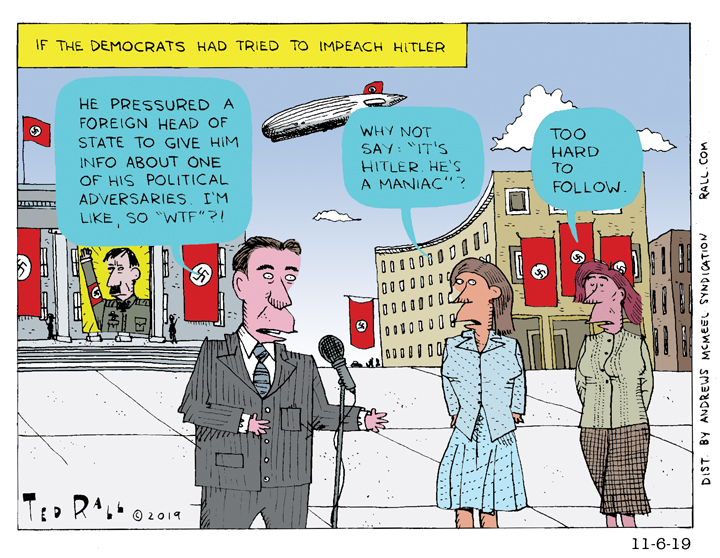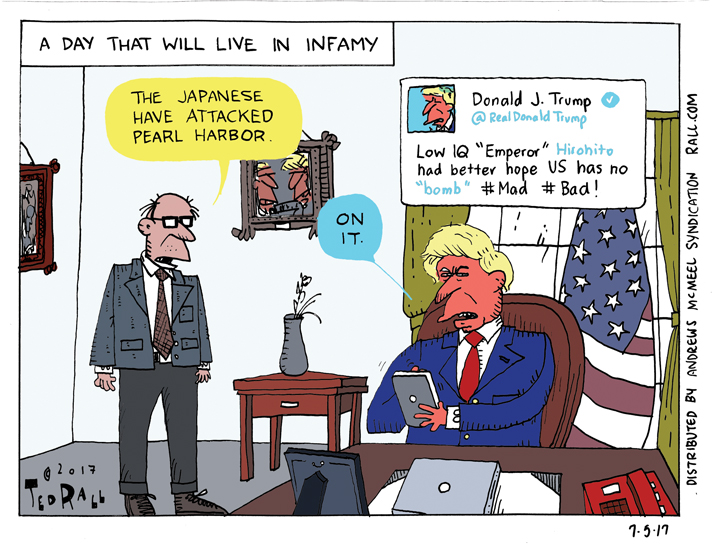First the United States and its allies pressure Russia by placing missiles in Poland, near its border. Then the West tries to expand NATO right up to the Russian border, by inviting Ukraine to join. When the Russians respond by massing troops along their own border, we have the unmitigated nerve to say that they are provoking us.
Why Are Politicians Waiting for the People? They Are Supposed to Lead
Whenever people push for positive change whether it be gay rights, equal rights for women, equality of income, or even something as basic as healthcare for everyone, centrist moderates always say the same thing: the country just isn’t ready yet. But politicians aren’t supposed to wait for the people to be ready for positive change. They are supposed to lead. That means making the case for the better world that is possible and pushing until it is achieved.
If the Democrats Had Tried to Impeach Hitler, They Would Have Ignored the Big Stuff
There’s a lot of good reasons to impeach Donald Trump. Let’s start with the fact that he is an asshole. Rude, crude, socially unacceptable. Openly talks in racist language. Coddles Nazis. But in their impeachment inquiry Democrats are instead focusing on a very hard to follow narrative about his phone call to the president of Ukraine, in which he asked that country to investigate Hunter Biden, the son of vice president Joe Biden, and initially threatened to withhold military aid but then granted it. This is way too much like Iran Contra: who can follow the story even if it’s true?
Trump’s Infamous Tweets
Continuing his effort to keep his twitter feed wild and crazy and important, President Trump recently issued a series of broadsides against members of the media. He seems to spend a lot of time tweeting, and significantly less time doing everything else. Though amusing, these mini-communiques are coarsening our national conversation.
SYNDICATED COLUMN: It Happened Here
 It began with the global economic crisis.
It began with the global economic crisis.
All around the world, millions of people who had nothing to do with the stock market crash — who didn’t earn enough money to save, much less invest, that much less speculate — lost everything nevertheless. They lost their jobs, then, in short order, their homes. They were scared.
The failure of democratic governance transformed their completely understandable fear into savage, uncontrolled anger.
Presidents and parliaments dithered. Part of the blame lie with the Constitution. It provided for a strong executive branch. Rather than grease the skids of government, it prompted members of the congress to dig in their heels, blocking every initiative they could because it was the only way to stay relevant.
The politicians knew they had a terminal systemic crisis on their hands, but they couldn’t agree how to respond. So they didn’t. The misery deepened.
Gridlock reigned.
The economy recovered. A little. Not much. But almost all the gains fell into the pockets of the wealthy and well-connected. Almost everyone else felt left out. They seethed.
Seeing opportunity amid the armies of the alienated and dispossessed, the perennial almost-candidate of the nationalist, nativist far-right began campaigning in earnest. Breaking all the rules of conventional campaigning, he drew huge crowds with a simple message:
Believe me.
Trust me, he assured his audiences, and I will make the country great again.
He was short on specifics and liberal with insults. Idiots, he called the incumbent politicians. They were losers — losers whose stupidity had betrayed a once-great country.
“People from this country can’t find a job. They can’t earn a decent living,” he ranted. “Foreigners must be expelled so our people can work!”
Forward-looking leaders within the establishment parties worried about the growing popularity of this strongman in the making. His intentions, after all, were dangerously radical — and they’d been published years before in a bestselling book. He was, he said himself, a “militarist.” Wars, fragmentation, scapegoating were all in the cards if he were allowed to come to power. But the parties weren’t motivated to respond. The system couldn’t save itself.
Some establishment analysts thought he was a flash in the pan, a buffoon whose appeal would fade in good time of its own accord. “The ranting clown who bangs the drum outside the…circus,” The Guardian called him.
The future tyrant’s natural ideological opposition couldn’t get it together. During key elections, they split their votes between the socialist Left and moderate liberals. Ultimately, however, historians blamed the Right most of all, for failing to rein in one of their own.
Traditional conservatives had played a dangerous game for years, using political “dog whistles” to appeal to citizens’ bigoted views of foreigners and ethnic minorities. As the economy worsened, this approach became more effective. Conservatives doubled down, setting the stage for what came next.
What the old guard didn’t understand was, that given a choice between half-hearted racism and the genuine article, the electorate would choose the authentic candidate. “He tells it like it is, and we need that now in a president,” 44% of voters told a major newspaper.
The conservative establishment faced a choice too: support a candidate of the left, or forsake true conservatism in favor of a fascist. To a man, they went with the fascist.
A tone of increasing violence accompanied the demagogue’s rise in the polls. Not only did he personally condone violence against his movement’s political opponents, his party offered its lawyers to defend partisans arrested for beatings in its name. Even his close associates were implicated in violent assaults; when they were, the Leader stood by them. “I think it’s a very very sad day in this country when a man could be destroyed over something like that,” he said.
The aging president was reluctant to issue an outright condemnation. “Troubling,” he called the gathering storm clouds.
The Leader’s authoritarian movement attracted a plurality of the vote — yet he wasn’t popular enough to consolidate a simple majority. Had his opponents set aside their personal ambitions and ideological biases, and united in favor of the national good, he could have been denied the chancellorship.
Alas, twelve years later, all would be ruins.
(Ted Rall is the author of “Bernie,” a biography written with the cooperation of Democratic presidential candidate Bernie Sanders. “Bernie” is now on sale online and at all good bookstores.)

